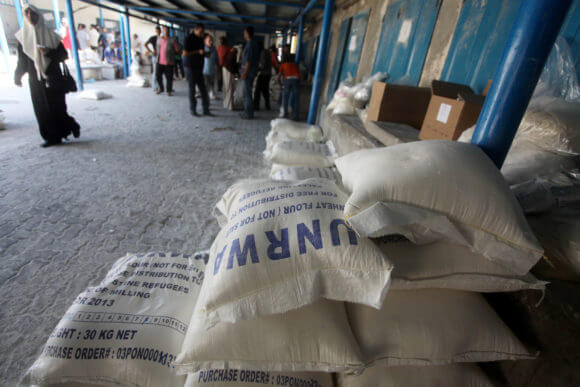The UN Relief and Works Agency for Palestine Refugees (UNRWA) announced on Monday its fears that some 1 million Palestinians in Gaza — half of the territory’s population — “may not have enough food” come June.
In a statement, the agency, which is responsible for providing humanitarian relief to some 6 million Palestinian refugees across the Middle East, said that 1 million Gazans who rely on food aid from UNRWA are at risk of going hungry if the agency does not secure at least $60 million in emergency funding in the next month.
According to UNRWA, 620,000 of the 1 million Gazans dependent on food aid are living in “abject poor” — “those who cannot cover their basic food needs and who have to survive on US$ 1.6 per day.”
The remaining 390,000 are “absolute poor,” surviving on about $ 3.50 per day. Without food assistance from UNRWA, the agency says these Gazans “cannot get through their day.”
“This is a near ten-fold increase caused by the blockade that lead to the closure of Gaza and its disastrous impact on the local economy, the successive conflicts that razed entire neighborhoods and public infrastructure to the ground, and the ongoing internal Palestinian political crisis that started in 2007 with the arrival of Hamas to power in Gaza,” the statement quoted Matthias Schmale, Director of UNRWA Operations in Gaza, as saying.
Citing a 2017 UN report that said Gaza would be “uninhabitable” by 2020 and a current unemployment rate of 53%, UNRWA’s statement noted that its services in Gaza are instrumental in keeping the territory “from the brink of total collapse.”
“At a time of increased uncertainty about the future of the Israel-Palestine peace process, UNRWA is one of the few stabilizing elements in a very complex environment,” the statement said.
“By continuing to deliver upon its mandate, the Agency remains a critical lifeline in Gaza, where its services in health and education and its defense of rights and dignity are indispensable to the most of Gaza’s 1.9 million inhabitants.”
Since the US decision to end all of its financial aid — around $300 million — to UNRWA last year, the agency has been struggling to recover, affecting the lives of the millions of Palestinian refugees it supports across the region.
Over the past year, as UNRWA has been forced to scale back many of its programs, refugees have felt the effects of the financial crisis in the form of job cuts, reduced healthcare coverage, and a decrease in school services across the region.
The UN reported at the end of 2018 that despite a rise in humanitarian needs across the occupied Palestinian territory, funding levels for humanitarian interventions declined significantly: only US$221 million had been received, compared to the $540 million requested in the 2018 Humanitarian Response Plan.



As far as donations, where can I donate? Thanks –
https://www.juancole.com/2019/05/thousands-palestinians-amputation.html
“Thousands of Innocent Palestinians in Gaza at Risk of amputation from Israeli Sniping” By Juan Cole, May 9/19
Ann Arbor (Informed Comment) – “Thousands of innocent Gaza Palestinian protesters wounded by live fire by Israeli snipers are in danger of losing limbs if the decrepit Gaza hospital system does not receive $20 million, according to Jamie McGoldrick, United Nations Humanitarian Coordinator for the occupied Palestinian territory.
“Since the Great March of Return protests began in spring of 2018, some 31,691 Palestinians have been injured by the Israeli army. Almost none of those wounded had actually come up to the border fence with Israel or gotten close enough to Israeli soldiers to endanger them. We are therefore talking about 31,0000 war crimes, since it is not permitted in international law for occupying troops to simply shoot down unarmed protesters.
“Most of those injured were hurt by military-grade tear gas, about which victims report that ‘Acute symptoms included loss of consciousness, breathing difficulties, rashes, and severe pain, all of which lasted many hours beyond the time they were directly exposed to the gas.’ Repeated exposure raises anxieties about chronic headaches and miscarriages. Some are injured by being hit by the teargas cannisters, which can cause serious injury and even death.
“About 7,000 Palestinian protesters in Gaza have been sniped out with scopes by professional Israeli snipers, and hit with live fire strategically targeting their legs.
“1,700 of those 7,000 are in immediate danger of bone infections and other complications and cannot hope to get good medical treatment in the Gaza Strip, where a decade of Israeli blockade has left the medical infrastructure woefully underfunded, and where Israeli airstrikes have sometimes hit hospitals.
“The only way local physicians have of saving the lives of these 1,700 sniping victims is to amputate a limb, even though amputation would never be called for if the victims were hospitalized in Israel proper or in Europe. Protesting being made homeless by Israeli policy, and taking a bullet in the process, is threatening them with permanent loss of a limb.
“Physicians have already been forced to carry out 120 amputations since the protests began last year. Twenty of these amputees have been children. Again, these children did not present any danger to Israeli troops and each time one was shot, a crime was committed by an Israeli soldier, who had the child in his scope and decided where exactly to put a bullet into her or his body.
“There is very high unemployment in Gaza, in part because of the Israeli blockade, and especially among youth. The average office worker makes $400 a week. Most Palestinian families in Gaza are $4,000 in debt. Most families cannot hope to be able to afford quality medical care.
“The United Nations had called for $350 million in aid for Gaza, but is getting only about 14% of that from international pledges.”
Half the UNRWA budget is allocated for education. Why is the UNRWA diverting money to education if families cannot feed themselves?